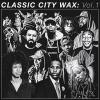Kamasi Washington Finds Power in the Harmony of Difference
Wednesday, Dec. 6 @ Georgia Theatre

Photo Credit: Jamie James Medina
Kamasi Washington recalls with ease the moment he decided to take music seriously: It was the the summer of 1996. The young tenor saxophone player from Inglewood, CA was a ninth-grade student at Hamilton High, a music magnet school on the west side of Los Angeles. A music teacher from nearby Watts, Reggie Andrews, had enlisted Washington to be a part of the Multi-School Jazz Band, which assembled kids from throughout the city to play music, some of whom had been Washington’s friends since childhood.
The group landed a gig at the Playboy Jazz Festival that summer. While rehearsing for the show, it seemed clear that Washington would not have a solo. “I had just kind of accepted that I wasn’t going to do one, so I was just playing the parts,” Washington says.
The group took the stage to perform for an audience of 20,000 people, as Washington recalls. In the midst of the show, without warning, Andrews gave Washington a nod to take a solo. “I just wasn’t ready for it,” Washington says.
A tone of disappointment still lingers in his voice as he relives the experience more than 20 years later. “I did the solo, but I wasn’t happy with it, and I felt awful about it,” he adds. “I decided right then and there that this would not happen again. I would practice every day. I cannot be casual about this. I love music too much for it to make me feel this way, so never again.”
As traumatic as the experience was, it lit a fire inside Washington that has burned more brightly with each passing year. His career is punctuated by two revolutionary jazz albums bearing his name; his string and saxophone arrangements that added depth to Kendrick Lamar's groundbreaking 2015 LP, To Pimp a Butterfly; and appearances on albums by Thundercat, Run the Jewels, Flying Lotus, Quincy Jones and more. It seems the balance between redemption and overcompensation lie at the heart of Washington’s drive, as each project he takes on leaves a deeper impression, musically and conceptually.
His latest offering, Harmony of Difference, released in September via the Young Turks label, is the culmination of a lifetime spent pushing the limits of his own musical comprehension, collaborations and improvisational instincts. It also facilitates a new dimension within the medium by which music is consumed. The six songs on Harmony of Difference were created to accompany a series of five abstract paintings by his sister, Amani, as part of the 2017 Biennial for New York's Whitney Museum of American Art. The sixth and final song, “Truth,” was paired with a short film by Spanish director A.G. Rojas, who is best known for creating videos for songs such as Jack White’s “Sixteen Saltines” and Earl Sweatshirt’s “Earl.”
“The idea was that you would come into a room where each of the five songs were playing, matched with a painting. The viewer would have an individual experience with each of the songs,” Washington explains. “You hear a song, and you see the painting. When the songs are over, the film would come up on the wall behind you, and the song would play through these really great surround-sound speakers. So, now everyone in the room is shifting to having this shared experience.
“It amplified the idea of an album by drawing upon the power of people coming together,” Washington says. “It was meant to embody this idea that even though our individual experiences and cultures are beautiful, it’s when they come together, and we combine those experiences, that the most beautiful things happen.”
As a standalone work, Harmony of Difference is a precise distillation of Washington’s penchant for crafting majestic works with a large ensemble. Songs such as “Humility,” “Knowledge” and “Perspective” ride a line where swelling horn crescendos reach an ecstatic breaking point, verging on the grandeur of a TV game show’s theme music. But swiftly, new rhythms, piano and horn lines, staccato percussion and cymbal crashes dive into glorious moments of post-bop and avant-garde jazz.
Clocking in at about a half-hour, Harmony of Difference takes shape as a precise, focused work that leaves the listener wanting more—a diametric shift from Washington’s nearly three-hour debut, 2015’s The Epic. Again, that dichotomy between overcompensation and redemption is hard at work in everything Washington does.
For his current tour, Washington leads a stripped-down variation of his Next Step and the West Coast Get Down ensembles. The lineup includes trombone player Ryan Porter, Rickey Washington on flute and soprano sax, Brandon Coleman on keys, Ronald Bruner Jr. and Robert Miller on drums and Joshua Crumbly on bass. Singer Patrice Quinn brings the ensemble to a fine point.
Many of the players in the Next Step have been playing with Washington as far back as that fateful day on stage at the Playboy Jazz fest, honing their shared chemistry and their abilities to play a little differently together each time they take the stage.
Creativity, Washington says, he equates it to surfing—riding a wave that can lead to a jump, a curl or other maneuvers, but always riding a wave. “It allows me to look inward and find the real gems of who I am,” Washington says. “It comes and goes. Sometimes it’s amazing, and sometimes it’s frustrating.”
Calendar
-
Wednesday, December 6
Georgia Theatre
Kamasi Washington, Moonchild
KAMASI WASHINGTON Boundary-pushing contemporary jazz musician out of Los Angeles. See story on p. 14.
MOONCHILD L.A.-based group with jazz, soul and hip-hop influences.
Keywords
More by Chad Radford
-

-

-

Classic City Wax Compilation Captures Current Moment in Athens Hip Hop
Saturday, Feb. 22 @ Caledonia Lounge









comments